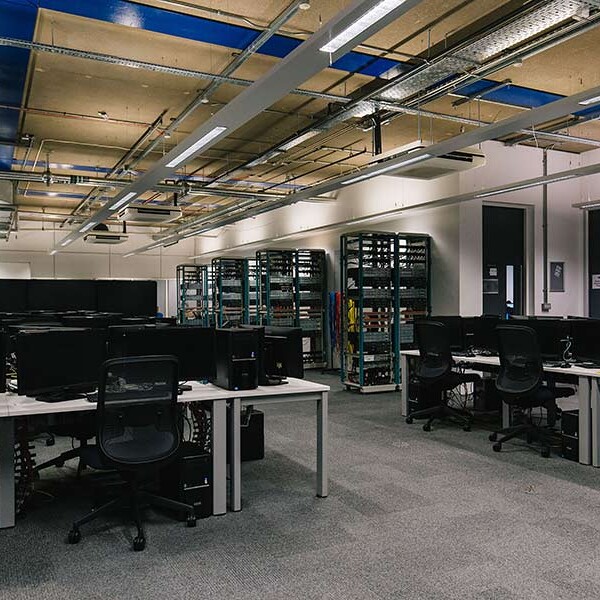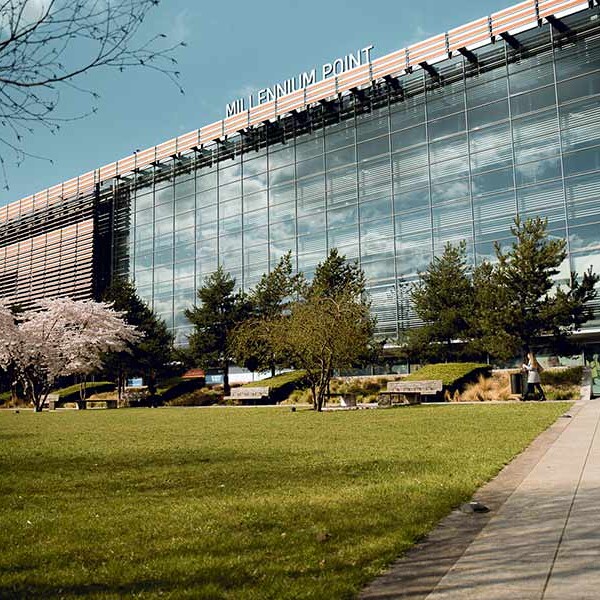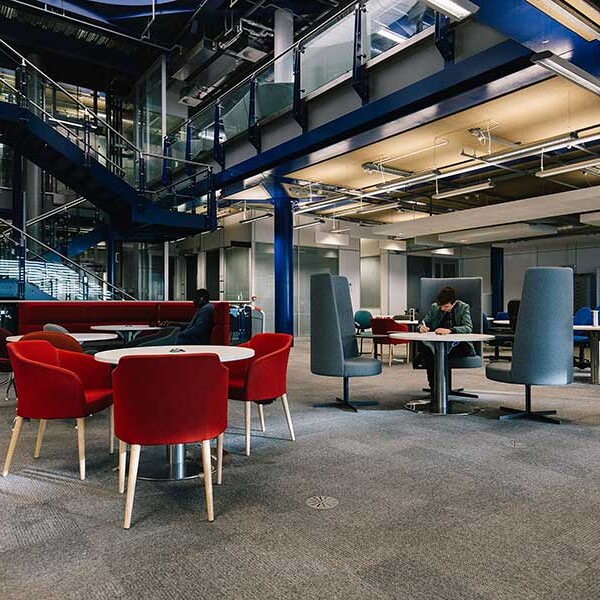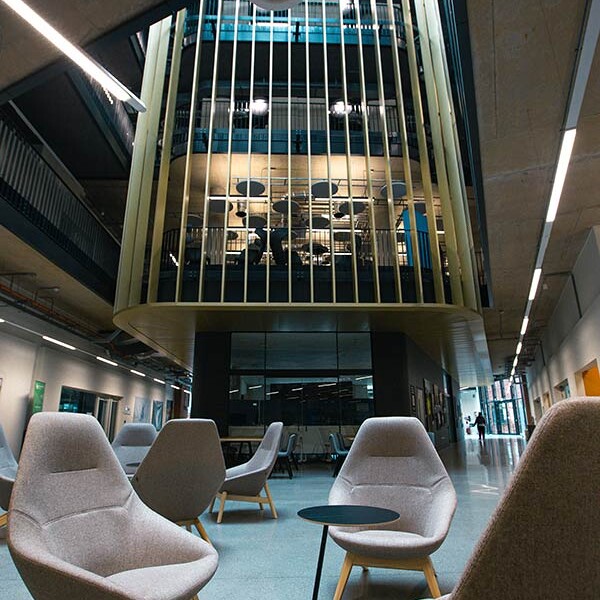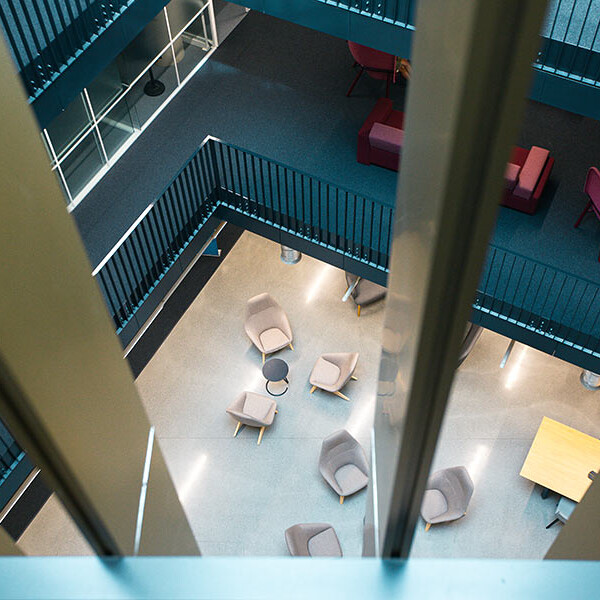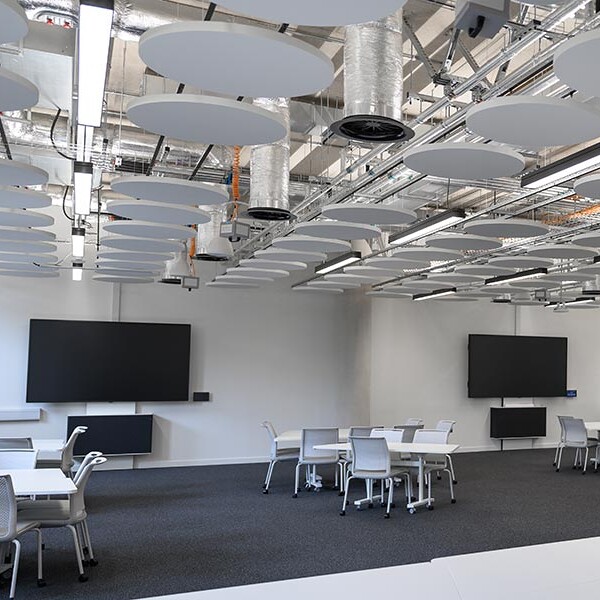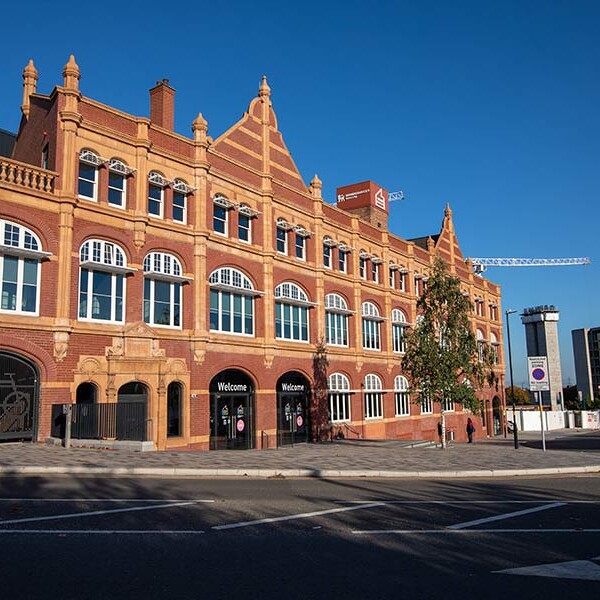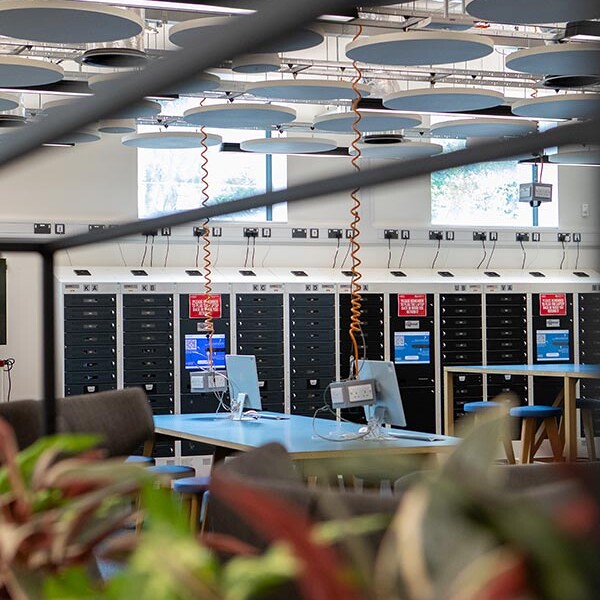
Artificial Intelligence - MSc
Currently viewing course to start in 2025/26 Entry.
This course will equip you with an understanding of the theory and practice of applied Artificial Intelligence (AI) systems through pathways. Streams include core AI and Fintech pathways.
- Level Postgraduate Taught
- Study mode Full Time
- Award MSc
- Start date September 2025
- Fees View course fees
- Subjects
- Location City Centre
This course is:
Open to International Students
Overview
[00:00:00] Speaker 1 A.I. - Artificial intelligence is already shaping the world of tomorrow. It has the potential to revolutionise every industry, from Chat GPT and driverless cars to healthcare, our world is increasingly relying on AI and data science to make decisions, solve problems and predict the future.
[00:00:20] Speaker 2 I didn't realise I was in demand in almost every industry, and the staff at BCU have the industry connections to help me kickstart my career.
[00:00:30] Speaker 1 AI graduates command higher salaries. Employers are willing to pay more for skilled graduates who can use AI to make their companies more efficient. And while AI is still seen as a relatively new career, the number of jobs requiring these skills has tripled in the last ten years. Our course equips you to become a specialist, even if you've never studied computer science before.
[00:00:52] Speaker 2 I was a newcomer to computer science at BCU. I've had the support I need to develop my knowledge from the ground up.
[00:01:00] Speaker 1 If you've got a minimum of a 2.2 Undergraduate degree in any subject whatsoever and you're a UK national, you could be eligible to receive a fully funded place to study artificial intelligence at Birmingham City University.
This course will equip you with a sound understanding of the theory and practice of applied Artificial Intelligence (AI) systems through pathways. Streams include core AI and Fintech pathways which have been designed to meet industry needs.
As a computing conversion course, it is assumed that you are starting fresh with no experience of computer programming and little experience of using mathematics or statistics in your undergraduate courses or in work.
What's covered in the course?
The course begins by creating a foundation in programming and mathematics, upon which you will build the expertise in several key areas of AI oriented to the pathway, going from first Python code and basic algebra, right through to Deep Learning. The core applied areas of the MSc AI include:
- Image Analysis - machine learning has shown incredible results recently in understanding the themes of images and video which are being applied in a range of commercial settings; from security and driverless cars, to online clothes shopping.
- Natural Language Processing - being able to understand speech and text is one of the cornerstones of AI systems. Chatbots built on AI are appearing all over the internet, but more than this, technology giants are searching for ways that machines can have detailed conversations with one another, and read and understand text documents.
- Time Series - dealing with dynamic data is vital to AI systems in finance, healthcare and defence; whether predicting system vulnerabilities, future stock prices or even predicting patient outcomes in ICU, and how a virus outbreak will permeate through a population.
The Fintech pathway complements learners with a finance background by applying AI techniques to risk management and portfolio analysis, giving graduates a competitive edge in the field. Core AI pathway learners will cover data visualisation with editorial design and AI pipelines and impact evaluation.
A strong focus on technology monitoring and ethics will be taught in a way to suit learners from all backgrounds; rather than through specific case studies which only suit certain types of learners. Ethics and horizon scanning frameworks are introduced to apply to any industry. The Master's project will have an industrial route, should you wish to work on an applied project with a corporate partner, and there will be a route on graduation to undertake a professional placement or go on to a doctoral research programme.

Introducing STEAMhouse
STEAMhouse is a centre for technology, innovation, creative thinking, prototyping and business development. Our £70 million pound building is the home for all of our Computing courses.
As the world is moving towards digitalisation, and there are more and more problems which have arisen especially after the Covid-19 pandemic, and hence there is a need to create better solutions for the real-world problems that people face. Artificial Intelligence has that potential to recognise problems and thus can develop solutions using existing data. Recognising this need, I chose this course to help try solve the real-world problems. After becoming a mother, I realised that in order to keep up with the fast-paced world, and especially during the pandemic I realised that I need to do a conversion course, which will enable me to have a fantastic career ahead.
Akanksha Vyas
Why Choose Us?
- Become an AI specialist - No matter your background, this course will prepare you to work in any area of data science competently with AI, your head and shoulders above everyone else in the graduate AI job market.
- Learn how to evaluate machine learning systems - Our course teaches you how to account for both the limitations and ethical issues that they create.
- Links with industry - Our delivery partners, such as Amazon, Huawei, Cisco, IBM and Microsoft will provide training for industry-standard systems making you able to solve problems important to your future employers, straight away.
- Flexible learning - You will be taught through a mix of face-to-face and remote learning to fit around other commitments.
- Fintech pathway available - this course has the option to specialise in fintech modules.
OPEN DAY
Join us for an Open Day where you'll be able to learn about this course in detail, chat to students, explore our campus and tour accommodation. Booking isn't open for this event yet, register your interest and we'll let you know as soon as booking goes live.
Next Event: 28 June 2025
Entry Requirements
Essential requirements
AI pathway
Applicants are normally expected to have a minimum of a 2:2 honours degree in any discipline, or three years of professional work experience in a role which has required you to work and interact with a range of people requiring a regular element of problem-solving.
Fintech pathway
Applicants are normally expected to have a minimum of a 2:2 honours degree in addition to a background in finance (e.g. an undergraduate degree in a finance-related subject such as Accountancy, Finance, Economics or Business Management) or three years of professional work experience in a finance role.
All applicants are also asked to provide a 250-word maximum personal statement detailing why they are ready for this course and how they want to use what they learn in their future career or in later life.
Applying with international qualifications
See below for further information on applying as an international student.
If you have a qualification that is not listed, please contact us.
Fees & How to Apply
UK students
Annual and modular tuition fees shown are applicable to the first year of study. The University reserves the right to increase fees for subsequent years of study in line with increases in inflation (capped at 5%) or to reflect changes in Government funding policies or changes agreed by Parliament. View fees for continuing students.
Award: MSc
Starting: Sep 2025
- Mode
- Duration
- Fees
- Full Time
- 12 months
- £10,820 in 2025/26
- Full Time
- 18 months with Professional Placement (see below*)
- £11,900 in 2025/26
International students
Annual and modular tuition fees shown are applicable to the first year of study. The University reserves the right to increase fees for subsequent years of study in line with increases in inflation (capped at 5%) or to reflect changes in Government funding policies or changes agreed by Parliament. View fees for continuing students.
Award: MSc
Starting: Sep 2025
- Mode
- Duration
- Fees
- Full Time
- 12 months
- £18,600 in 2025/26
- Full Time
- 18 months with Professional Placement (see below*)
- £20,460 in 2025/26
Application deadlines
We advise you to apply early to allow sufficient time for you to prepare to start your studies in September. Please apply by Friday 18 July to allow time to arrange accommodation, student finance and visas where required.
Late applications will be accepted where places are still available, but please note that Welcome Week begins on Monday 15 September 2025, and teaching begins on Monday 22 September 2025. International students are invited to arrive from Monday 8 September 2025.
To find out more, see our application timeline.
Professional Placement option*
The Professional Placement option will allow you to complete a credit bearing, 20 week Professional Placement as an integral part of your Master’s Degree. The purpose of the Professional Placement is to improve your employability skills which will, through the placement experience, allow you to evidence your professional skills, attitudes and behaviours at the point of entry to the postgraduate job market. Furthermore, by completing the Professional Placement, you will be able to develop and enhance your understanding of the professional work environment, relevant to your chosen field of study, and reflect critically on your own professional skills development within the workplace.
You will be responsible for finding and securing your own placement. The University, however, will draw on its extensive network of local, regional and national employers to support you in finding a suitable placement to complement your chosen area of study. You will also benefit from support sessions delivered by Careers+ as well as advice and guidance from your School.
Placements will only be confirmed following a competitive, employer-led selection process, therefore the University will not be able to guarantee placements for students who have registered for the ‘with Professional Placement’ course. All students who do not find a suitable placement or do not pass the competitive selection process will be automatically transferred back to the standard, non-placement version of the course.
Personal statement
You’ll need to submit a personal statement as part of your application for this course. This will need to highlight your passion for postgraduate study – and your chosen course – as well as your personal skills and experience, academic success, and any other factors that will support your application for further study.
If you are applying for a stand alone module, please include the title of the module you want to study in your Personal Statement.
Not sure what to include? We’re here to help – take a look at our top tips for writing personal statements and download our free postgraduate personal statement guide for further advice and examples from real students.
Course in Depth
Module
In order to complete this course, you must successfully complete all the following CORE modules (totalling 140 credits):
Computing proficiency is essential in modern data science and a firm grounding is required before the more technical themes of Artificial Intelligence (AI) can be studied. This is the introductory module for the programme where no prior computational foundations are assumed. A holistic view of computing will be provided covering the important themes of data management, programming and security considerations. The module will start from principles of data structures and algorithms, using Python for implementations, which will then be applied to database structures, both SQL and NoSQL, enabling learners to construct programs using standard industrial practices.
Artificial Intelligence (AI) is a core component of computer science, aiming at developing intelligent agents that mimic human’s cognitive capability in learning, reasoning, and problem-solving. As a branch of AI, machine learning (ML) allows to learn and adapt (from examples), rather than being explicitly programmed for a particular outcome. This module will offer you the statistical grounding required by data scientists to construct and evaluate the effectiveness of AI systems. Probability theory and statistical evaluation will lay the foundations to be used in a range of real-world scenarios. Standard machine learning techniques for regression, clustering and classification will be covered in this module. You will develop the practical skills needed for applied machine learning including the use of existing tools and techniques needed to solve industry-standard problems based on use cases extracted from real domains.
Modern artificial intelligence (AI) has become popular primarily because it can deal with data of various kinds. The ability to handle this data arises thanks either to the pre-processing that makes the data amenable for subsequent analysis/modelling, and/or to the nature of AI algorithm itself. Over the past half-century a range of different algorithms and approaches have been designed to handle structured data challenges in areas such as time series prediction, natural language modelling and image analysis. In this module you will be taught the targeted ways in which inferences can be made in these domains motivated with real-world projects. In addition to this you will be given a grounding in optimisation of parametric models and subsequent feature selection will be given to identify optimal tools for data analysis.
Following a series of breakthrough developments starting in 2006 the field of Deep Learning has attracted interest from a range of fields and is now receiving billions of pounds of investment across the world. Harnessing these techniques can leverage insight into problems not previously recognised. This module will contrast the application domain-specific methods from the Applied AI module with a set of generalised Deep Learning machines to show how they are applied to unstructured data. In particular, the module will teach you how to attack image analysis, natural language and reinforcement learning problems with these models whilst critically analysing the costs and benefits of implementation.
The purpose of the module is to enable you to undertake a sustained, in-depth and research-informed project exploring an area that is of personal interest to you. In agreement with your supervisor, you will decide upon your topic which will take the form of a practical outcome (artefact) with accompanying contextual material. This can be oriented towards any area of AI and there is the opportunity for an industrial project run in co-operation with one of our partner organisations.
In addition, you must choose either to study the AI Pathway or the Fintech Pathway and successfully complete 40 credits from the following PATHWAY modules:
The aim of this module is to identify, apply and design data visualisations. The module provides you with the fundamental principles and practice-based activities needed to design data visualisations for both different contexts, and different types of data. More advanced visualisation concepts and tools for analysing multi-dimensional data and large data sets will also be examined and appraised. You will learn how to employ visualisation as a tool that can help users understand large and complex data sets, conveying the outputs to a diverse audience.
Artificial Intelligence (AI) is expected to transform the way we humans live and work helping us to solve complex problems and live more enriched lives. From healthcare to finance, AI now impacts nearly every industry through dramatically improving the efficiencies of workplaces and expanding the capabilities of the work humans can do. When AI takes over repetitive or dangerous tasks, minimises occurrences of ‘human error’ or support decision making, it frees up the human workforce to do work they are better equipped for; tasks that involve creativity and empathy among others. This module will discuss the impact of AI with focus on AI project life cycles, horizon scanning, AI ethics and AI applications.
This module considers financial risk management strategies; how risk is evaluated; the methods that are available to hedge against risk and the strategies that are employed to mitigate risk. This is complemented by consideration of examining the impact of financial regulation on emerging FinTech businesses and considers the ways in which new technology challenges traditional models of financial regulation and ethical dilemmas.
The purpose of this module is to help you to develop a critical understanding of the principles and practices of securities analysis and portfolio management, with a systematic focus on financial decision-making for investment. To achieve this goal, various models and methods will be applied to real-time financial market data for constructing efficient portfolios and identifying the optimal portfolio. By utilizing computational tools and professional databases, you can engage in effective learning and practical-based studies.
Download course specification
Download nowCourse breakdown
Knowledge and understanding are acquired though a mixture of formal lectures, tutor-led seminars and practical activities, with other independent learning activities at all stages. For more information about this course please get in touch with the course leader, course lead, Dr. Faisal Saeed, faisal.saeed@bcu.ac.uk
Employability
Enhancing your employability skills
We know that employers are looking for graduates who have a good balance between in-depth academic knowledge and technical and practical expertise, which is why our course is geared towards employability.
What you learn on our course will help you to stand out when you look for your first professional role. Because you will know how to use sophisticated, industry-standard software, you will be able to demonstrate that you can put into practice your deep theoretical knowledge.
We will also prepare you for a career by equipping you with a range of transferable skills, such as complex problem-solving expertise, the ability to analyse in a careful and considered manner, and working as a team member. We aim to have you employer-ready by the time you graduate and, as part of your Advanced Computer Science course, we will invite guest speakers to underpin the subjects taught.
Thanks to our excellent partnerships and working relationships with some of the UK’s leading companies, you have the chance to network with leading organisations such as IBM, Dignity plc, Mortgage Brain and Griffiths Waite. In addition, our specialist industry links with the Linux Professional Institute, the Oracle Academy, Cisco, and Microsoft, plus our world-class facilities, will mark you out as a highly employable graduate.
This is why our graduates have gone on to pursue computing and software development and designer careers in a wide range of industries, from SME software companies, to industry, government, banking and healthcare. Furthermore, many graduates continue their studies to Doctorate level.
Facilities & Staff
Our Facilities
We are constantly investing in our estate and are currently in the process of spending £260 million on new learning facilities. This course will be taught at Millennium Point at the City Centre Campus.
The course is supported with a wide range of cutting-edge facilities in the City Centre Campus. We have a state-of-the-art computer games technology lab which contains high-performance PCs, Sony PlayStation development kits and a range of industry standard software including Unity, Unreal and a suite of professional Microsoft development tools.
We also have many open access areas where students can study together and even hire out laptops for use in these spaces and others within the university.
Within the University there are many internationally recognised research teams giving you the opportunity to collaborate with them on exciting interdisciplinary projects.
Computer networking
The laboratories are well-equipped for all our computer networking courses, as well as specialist areas for practical work such as voice-over internet protocol (VoIP), forensic and ethical hacking technologies, wireless and mobile technologies and radio frequency identification technologies to name but a few.
Software development and computer programming
There are a number of open access, software development and computer programming laboratories that can be used to develop systems and programmes, including database management systems such as MySQL, to name but a few.
Systems laboratories
Our embedded systems laboratories are used to develop real-time systems, such as specialist hardware training and development resources, and industrial-standard software development and simulation tools. These include microcontroller software and robotics design and development, to name but a few.
Electronic systems
To underpin the basic principles of electronic systems, we have a well-equipped laboratory of general and specialist test and measurement kits, including powered prototyping development boards, dual power supplies, frequency generators and counters and digital multi-meters to name but a few.
Forensic computing
Our successful development of forensic computing has led to a specialist forensics laboratory that is fully equipped with essential hardware and software for this sensitive area of study. The laboratory includes high-spec PCs with built-in multi interface Tableau write blockers, EnCase and FTK computer forensic software and steganography detection and analysis software, to name but a few.
Our staff
Dr Faisal Saeed
Associate Professor
Faisal Saeed is an Associate Professor at the College of Computing and Digital Technology, at Birmingham City University. He leads the MSc Artificial Intelligence course and Research Summer School at the College. Previously, he worked as an Assistant and Associate Professor at the Information Systems Department, Taibah University, KSA (2017-2021),...
More about FaisalNouh Elmitwally
Lecturer in Data Science
Lecturer in Data Science, Machine Learning, and Deep Learning with 4+ years of experience in the United Kingdom and other countries. He received a PhD degree in Computer Science from the University of Surrey, the UK, and a BSc MSc from Cairo University, Egypt. Before joining BCU in September 2022, he had a long international career in computer...
More about NouhDr. Shadi Basurra
Professor of Intelligent Systems
Prof. Dr. Shadi Basurra, Professor of Intelligent Systems, graduated from the University of Exeter - BSc, UK (2007) and the University of Kent – MSc, UK (2008). He earned his PhD from the University of Bath (in collaboration with Bristol University) in 2012 through a scholarship from Toshiba, Great Western Research, and the Yemeni government. He...
More about Shadi


